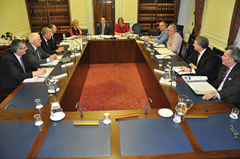Justice Committee: a progress report
 agendaNi reviews the work of the Assembly’s Justice Committee, including its progress on rights for victims and witnesses.
agendaNi reviews the work of the Assembly’s Justice Committee, including its progress on rights for victims and witnesses.
The Justice Committee scrutinises some of the Assembly’s most serious responsibilities, in terms of policy. While justice is traditionally contentious, the committee has largely agreed on meeting the needs of victims and witnesses of crime.
Chairman Paul Givan has several family connections in the Prison Service and has regularly emphasised prison as a punishment for offenders. His Deputy Chairman, Raymond McCartney, is an ex-prisoner and has focused on community justice, equality and human rights in the system.
Alban Maginness, a barrister, is the only committee member with a career background in justice.
The committee has published six reports since the 2011 Assembly election: on judicial appointments, victims and witnesses of crime, the Criminal Justice Bill, two minor legislative consent motions, and an end-of-session report for 2011-2012.
Judicial appointments policy was last amended by the Northern Ireland Act 2009. Nominees for High Court and Court of Appeal posts are selected by the UK Government, following advice by the Northern Ireland Judicial Appointments Commission.
The committee was required to carry out a review of judicial appointments policy by 30 April 2012; this was a brief exercise due to the relatively short deadline. Its report, on 26 April, concluded that the current arrangements “appear to be working satisfactorily”. Members plan to consider the issue again later in the Assembly’s term.
A detailed inquiry into the experience of victims and witnesses was launched in October 2011. The inquiry report, published last July, called for the introduction of a ‘victim and witness charter’ with an emphasis on informing them on each stage of their case and the offender’s release from custody. Bereaved families, it said, should receive the same rights.
An independent complaints mechanism was also proposed, along with compulsory training on the care and treatment of victims and witnesses for all criminal justice staff, and a ‘witness care unit’ in each court region to act as a single point of contact.
The report also proposed a maximum waiting time for witnesses in court houses, an automatic right for victim impact statements in all serious crime cases, and greater use of specialist courts e.g. for domestic violence and cases involving young people.
Legislation on victim impact statements and a victims’ charter is due to be included in the ‘faster, fairer justice Bill’ later this year.
Members were content with most aspects of the Criminal Justice Bill, although they added that more legislation should be considered to deal with human trafficking. Sinn Féin members claimed that the standards on DNA retention fell short of human rights standards.
Last November, the committee also described the Justice Minister’s decision to close four court houses as “premature” and said that their future should have been considered as part of the wider review of the justice estate.
The Justice Committee’s forward work programme for March includes briefings on the new victims’ and witnesses’ strategy and the reform of bail in criminal proceedings. While the Justice Committee’s remit technically covers all aspects of the system, it mainly scrutinises the courts, prisons and probation. This avoids an overlap with the Northern Ireland Policing Board, which holds the PSNI to account.
Membership
Chair: Paul Givan (DUP)
Deputy Chair: Raymond McCartney (SF)
Stewart Dickson (Alliance)
Alex Easton (DUP)
Tom Elliott (UUP)
William Humphrey (DUP)
Seán Lynch (SF)
Rosaleen McCorley (SF)
Patsy McGlone (SDLP)
Alban Maginness (SDLP)
Jim Wells (DUP)





